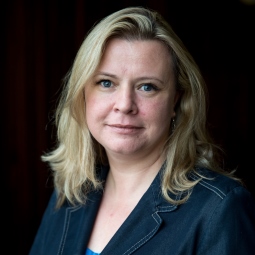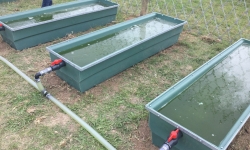CSIR pioneers the low-cost treatment of domestic wastewater in Africa
The CSIR-developed algae wastewater treatment technology has proven successful at two sites in South Africa and is ready to be exported.
The CSIR-developed algae wastewater treatment technology has proven successful at two sites in South Africa and is ready to be exported.
The low-cost phycoremediation treatment that does not require electricity or a skilled workforce removes nutrients from domestic wastewater by treating the wastewater with a consortium of algae, specifically cultivated to remove nutrients from the water column. The technology has been successfully demonstrated both inland and on the coast at the Sekhukhune District Municipality, in Limpopo, and in Mossel Bay Local Municipality, in the Western Cape, respectively.
Concerns around downstream users of the Olifants River using eutrophic water for irrigation prompted the investigation into alternatives for water treatment. The laboratory study found that culturing a specific consortium of algae in combination could remove half of the nitrates and up to 70% of phosphates from the water column. Under the leadership of CSIR chief researcher Dr Paul Oberholster, a field study was funded by the Department of Science and Technology and the Water Research Commission in 2014, at the Motetema wastewater treatment works in Limpopo. This first study proved successful and led to a follow-up study at the Brandwacht wastewater treatment works, located near the town of Grootbrak and co-funded by the African Development Bank’s African Climate Technology Centre. This second study, in its final year, is being implemented under the leadership of CSIR senior researcher Dr Paul Cheng. The aim of the follow-up study is to test the removal efficiencies and the cultivability of the algae at coastal cities with different temperature and rainfall patterns in lieu of climate change impacts. This second iteration of the phycoremediation treatment of domestic wastewater proved successful and received an award for the best wastewater pond system at the recently held Department of Water Affairs and Water Institute of Southern Africa awards ceremony.
As part of the African Development Bank co-funded project, under the leadership of CSIR researcher Maronel Steyn, feasibility studies were conducted to implement the technology in other Southern African Development Community member countries, including Botswana and Malawi. A request for funding has already been made to implement the technology in Malawi, and to investigate the feasibility for this technology in Mauritius, Mozambique and Namibia. Additionally, two licences have been granted to external companies to implement the technology in other South African municipalities.
Next steps
Now in its final year, the Brandwacht project team is assessing the potential risks and benefits associated with the algal biomass. After absorbing the nutrients, the algae needs to be removed from the water. The team is currently assessing the removal of the top layer of the water to algae drying beds. The dried algal biomass will be tested for its beneficial constituents, such as nitrate and phosphate levels. Once it has been cleared for potential human and environmental risks, the algae could be pelleted or directly mixed into soil as bio-fertiliser and/or animal feed.



